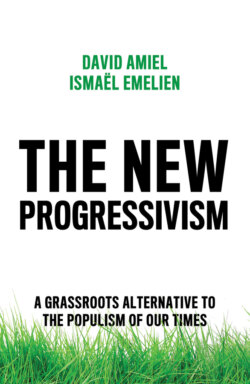The New Progressivism

Реклама. ООО «ЛитРес», ИНН: 7719571260.
Оглавление
David Amiel. The New Progressivism
CONTENTS
Guide
Pages
The New Progressivism. A Grassroots Alternative to the Populism of Our Times
Acknowledgements
Introduction
1 The society of frustration
The strange split between left and right
The promise betrayed
Social, geographical and economic immobility
The invisible culprit
Political monopolies
Notes
2 Maximizing possibilities (or the first principle of progressivism)
Equality of opportunity is not an opportunity for equality
The cult of education rather than the cult of qualifications
Innovation versus monopoly
Positive discrimination is still discrimination
Tomorrow, augmented humanity?
Notes
3 There are more possibilities when we act together (or the second principle of progressivism)
Globalization without submission
Diversity without division
The individual without individualism
Notes
4 Starting from the bottom (or the third principle of progressivism)
The new administration
How can all this be changed?
The new mediating bodies, the new local democracy
The new pyramid of powers
New political movements
From fake politics to fake news
What is the point?
Notes
5 Populist suicide
From frustration to revolt
No barracks, kolkhoz or convent
Building up a majority
Notes
Conclusion
Notes
POLITY END USER LICENSE AGREEMENT
Отрывок из книги
David Amiel
Ismaël Emelien
.....
This seems counter-intuitive. Many believe that electoral victory cannot be won without falling back on the tricks used by the populists: the lie (euphemized as ‘alternative truth’); demagogy; and a virulent nationalism, often tinged with racism. In short, there is a widespread feeling that progressivists cannot win elections unless they ape their opponents. In 2017, Macron demonstrated that this was false: you can win by telling the truth, by avoiding engaging in personal attacks, trusting the intelligence of voters — and even by showing goodwill! You can win, above all, if you put forward a positive, exciting programme, one which touches the citizens’ heartfelt expectations and is not limited to denouncing the madness of populists, or opportunistically welding together mere fragments of the electorate.
The same people assume that, once power has been won, the advantage will now lie with the progressivists, who will be able to draw on their skill, if not their experience, to run public affairs — while populists are often short of such skill and experience. Everyone can still remember how long the Trump administration needed to set itself up, or the game of musical chairs that ministers in the Brazilian populist Bolsonaro’s government indulged in just weeks after it took office. Again, these people are wrong. Implementing progressivism is a daunting task. Progressivism is not a conservatism and, if it is to transform society, it needs to overcome all the forces of inertia ranged against it — particular interests, of course, but also, quite simply, habits. It must break with the politics of the old school, and in doing so it runs the risk of attracting the wrath of all the old guard, who hate the fact that the game is no longer played by the rules they had learned by heart and that they thought were immutable. But progressivism cannot resort to the simple slogans of populism, since society is not changed for the better by angry tweets or capricious decisions.
.....